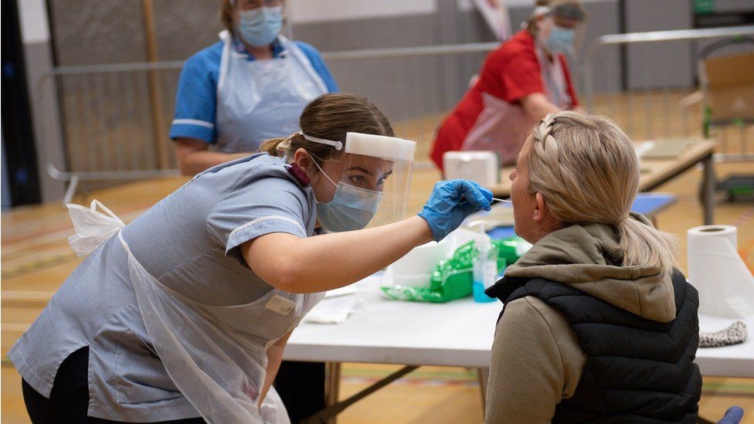The mass use of rapid Covid tests has been defended by a senior NHS adviser, amid concerns over their accuracy.
Dr Susan Hopkins, chief medical adviser to NHS Test and Trace, said the lateral flow tests could identify many cases of infection in people without symptoms.
Speaking to BBC Radio 4's Today programme, she acknowledged there had been "false negatives" but stressed the policy was a "game-changer".
Mass testing is being introduced in England's tier-three "high-risk" areas.
It is also starting in one of the areas hardest-hit by Covid-19 in Wales.
And more than million rapid tests are being sent to care homes in England over the next month to allow safe indoor visits.
However, an article in the BMJ medical journal has raised concerns about the effects of rapid testing in Liverpool, where a pilot scheme was carried out. The lateral flow tests were reported to have missed half of all cases and a third of those with a high viral load who were likely to be the most infectious.
Dr Hopkins said the tests had "limitations" but stressed they were helping diagnose asymptomatic cases that would otherwise have gone undetected, adding: "What we are doing here is case detection. We are not saying people do not have the disease if their test is negative.
"We are trying to say [to people who test positive] 'You do have the disease and now we want you to go and isolate for 10 days.' That is a whole different game-changer."
Asked about concerns people who were declared negative could have a misplaced sense of reassurance, Dr Hopkins stressed mass-testing did not end the need for social distancing.
"We are also very clear that until we get a much lower prevalence of disease in this country that we shouldn't be changing our behaviours," she said.
Her comments came as the UK's chief medical officers warned the winter could be "especially hard" for the health service because of coronavirus.
Officials are preparing to begin using the Pfizer/BioNTech Covid-19 vaccine from as early as Tuesday.
But in a letter to colleagues, the chief medical officers of England (Prof Chris Whitty), Scotland (Dr Gregor Smith), Wales (Dr Frank Atherton) and Northern Ireland (Dr Michael McBride) said: "Although the very welcome news about vaccines means that we can look forward to 2021 with greater optimism, vaccine deployment will have only a marginal impact in reducing numbers coming into the health service with Covid over the next three months."
Latest Stories
-
Kotoko Coach Zito admits Gold Stars ‘hold advantage’ ahead of crucial league clash
1 minute -
“This is nothing short of political harassment” – NPP slams NDC over arrests of party members
3 minutes -
Harvard sues Trump administration for blocking foreign student enrolment
11 minutes -
Adenta Kumi’s wife suffered miscarriage after his dramatic arrest by security operatives – Justin Kodua claims
16 minutes -
Jeffrey Nortey pays homage to Ga Mantse ahead of show in June
28 minutes -
Auditor-General to submit interim report on contractor claims for payments to begin- Finance Minister
31 minutes -
Total mobile money transactions hit GH₵365bn by April 2025
34 minutes -
Minority accuses Finance Minister of breaking the law over unpaid statutory funds
41 minutes -
Audit Service refutes UTAG-UG claims, defends integrity of audit report on UG compensations
41 minutes -
Sports and Recreation Ministry adopts Amartefio Committee recommendations
44 minutes -
Attack on my manager at AfroNation Portugal made me see things differently – Gyakie
51 minutes -
High Court withdraws arrest warrant against Director of Passports – Foreign Affairs Ministry confirms
51 minutes -
GPL: Kassim Mingle named Coach of the Month award for April
59 minutes -
Mpox cases in Ghana reaches 9 – GHS
1 hour -
Akrobeto survives car accident on Accra-Kumasi highway
1 hour

